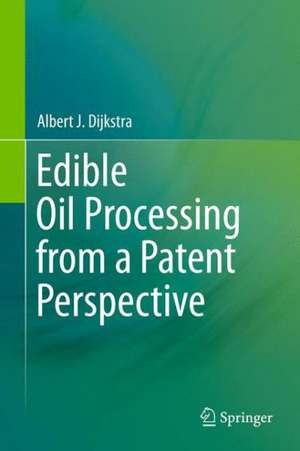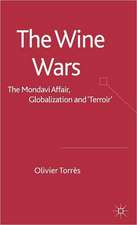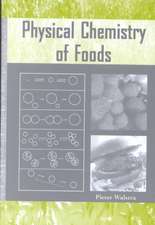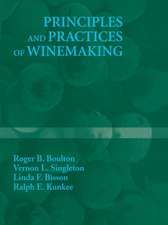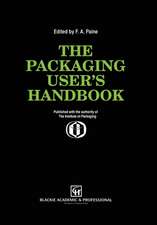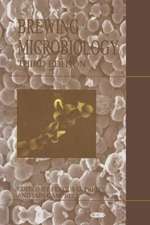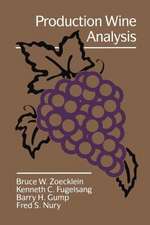Edible Oil Processing from a Patent Perspective
Autor Albert J. Dijkstraen Limba Engleză Paperback – 15 oct 2014
Patents dealing with edible oil processing are used to explain various aspects of patenting. To make the explanations less impersonal, some have been larded with personal remarks and experiences. Accordingly, this monograph is intended for scientists and engineers dealing with edible oils and fats who want to extend their sources of technical information. Hopefully, it will inspire them to innovate, help them to avoid duplication, and provide them with some amusement.
| Toate formatele și edițiile | Preț | Express |
|---|---|---|
| Paperback (1) | 696.68 lei 6-8 săpt. | |
| Springer Us – 15 oct 2014 | 696.68 lei 6-8 săpt. | |
| Hardback (1) | 646.43 lei 6-8 săpt. | |
| Springer Us – 28 sep 2012 | 646.43 lei 6-8 săpt. |
Preț: 696.68 lei
Preț vechi: 819.62 lei
-15% Nou
Puncte Express: 1045
Preț estimativ în valută:
133.31€ • 139.56$ • 110.30£
133.31€ • 139.56$ • 110.30£
Carte tipărită la comandă
Livrare economică 05-19 aprilie
Preluare comenzi: 021 569.72.76
Specificații
ISBN-13: 9781489973412
ISBN-10: 1489973419
Pagini: 292
Ilustrații: XVI, 276 p.
Dimensiuni: 155 x 235 x 15 mm
Greutate: 0.41 kg
Ediția:2013
Editura: Springer Us
Colecția Springer
Locul publicării:New York, NY, United States
ISBN-10: 1489973419
Pagini: 292
Ilustrații: XVI, 276 p.
Dimensiuni: 155 x 235 x 15 mm
Greutate: 0.41 kg
Ediția:2013
Editura: Springer Us
Colecția Springer
Locul publicării:New York, NY, United States
Public țintă
Professional/practitionerCuprins
Preface.- 1. Introducing the World of Patents.- 2. Production of Oils and Fats from Single Cells and Animal Raw Materials.- 3. Production of Vegetable Oils from Fruits and Germs.- 4. Production of Vegetable Oils from Oilseeds and Beans.- 5. Degumming.- 6. Neutralization.- 7. Bleaching.- 8. Dewaxing.- 9. Vacuum Stripping.- 10. Hydrogenation.- 11. Interesterification.- 12. Fractionation.
Recenzii
From the reviews:
“This book consists of 12 chapters and 290 pages of valuable information, well referenced with regards to topics and authors. It is easy to read and flows well with several humorous anecdotes and comments. I have used it several times to great effect on current projects. I can strongly recommend this book and is an excellent addition to any technical bookshelf.” (Laurence Eyres, Food New Zealand, February/March, 2013)
“This book consists of 12 chapters and 290 pages of valuable information, well referenced with regards to topics and authors. It is easy to read and flows well with several humorous anecdotes and comments. I have used it several times to great effect on current projects. I can strongly recommend this book and is an excellent addition to any technical bookshelf.” (Laurence Eyres, Food New Zealand, February/March, 2013)
Notă biografică
Albert Dijkstra studied chemistry at Leiden University, specializing in gas kinetics. He never received any specific training in the three subjects treated in this monograph: lipid chemistry, chemical technology, and patents. That may be the reason why he continues to query what he does not understand in these subjects, question established truths, and expose myths. As a result, he has developed several novel processes in the field of directed interesterification, degumming, dry fractionation, and the regeneration of spent bleaching earth. He has also derived an equation for the stripping medium usage in continuous counter-current vacuum stripping, suggested an improved mechanism for the chemical interesterification reaction, contributed to the understanding of the hydrogenation process by highlighting the role of the hydrogen concentration, and introduced the determination of trace metals by ICP in the field of edible oil analysis.
This has led to wide recognition: AOCS Chang Award (1997), EuroFedLipid Technology Award (2002), AOCS Bailey Award (2009), AFECG Chevreul Medal (2009), AOCS Mounts Award (2010). He is also a Fellow of the AOCS and Associate Editor of its journal and its Lipid Library website. Although retired, he is active as a scientific consultant, author, editor, inventor, and lecturer.
This has led to wide recognition: AOCS Chang Award (1997), EuroFedLipid Technology Award (2002), AOCS Bailey Award (2009), AFECG Chevreul Medal (2009), AOCS Mounts Award (2010). He is also a Fellow of the AOCS and Associate Editor of its journal and its Lipid Library website. Although retired, he is active as a scientific consultant, author, editor, inventor, and lecturer.
This has led to wide recognition: AOCS Chang Award (1997), EuroFedLipid Technology Award (2002), AOCS Bailey Award (2009), AFECG Chevreul Medal (2009), AOCS Mounts Award (2010). He is also a Fellow of the AOCS and Associate Editor of its journal and its Lipid Library website. Although retired, he is active as a scientific consultant, author, editor, inventor, and lecturer.
This has led to wide recognition: AOCS Chang Award (1997), EuroFedLipid Technology Award (2002), AOCS Bailey Award (2009), AFECG Chevreul Medal (2009), AOCS Mounts Award (2010). He is also a Fellow of the AOCS and Associate Editor of its journal and its Lipid Library website. Although retired, he is active as a scientific consultant, author, editor, inventor, and lecturer.
This has led to wide recognition: AOCS Chang Award (1997), EuroFedLipid Technology Award (2002), AOCS Bailey Award (2009), AFECG Chevreul Medal (2009), AOCS Mounts Award (2010). He is also a Fellow of the AOCS and Associate Editor of its journal and its Lipid Library website. Although retired, he is active as a scientific consultant, author, editor, inventor, and lecturer.
This has led to wide recognition: AOCS Chang Award (1997), EuroFedLipid Technology Award (2002), AOCS Bailey Award (2009), AFECG Chevreul Medal (2009), AOCS Mounts Award (2010). He is also a Fellow of the AOCS and Associate Editor of its journal and its Lipid Library website. Although retired, he is active as a scientific consultant, author, editor, inventor, and lecturer.
This has led to wide recognition: AOCS Chang Award (1997), EuroFedLipid Technology Award (2002), AOCS Bailey Award (2009), AFECG Chevreul Medal (2009), AOCS Mounts Award (2010). He is also a Fellow of the AOCS and Associate Editor of its journal and its Lipid Library website. Although retired, he is active as a scientific consultant, author, editor, inventor, and lecturer.
This has led to wide recognition: AOCS Chang Award (1997), EuroFedLipid Technology Award (2002), AOCS Bailey Award (2009), AFECG Chevreul Medal (2009), AOCS Mounts Award (2010). He is also a Fellow of the AOCS and Associate Editor of its journal and its Lipid Library website. Although retired, he is active as a scientific consultant, author, editor, inventor, and lecturer.
Textul de pe ultima copertă
Patent literature has always been a mine of information, but until recently, it was difficult to access. Now, with the Internet, access to all patent documents is almost instantaneous and free. However, interpreting the technical information provided by patent literature requires a certain skill. This monograph aims to provide that skill by explaining patent jargon and providing background information on patenting.
Patents dealing with edible oil processing are used to explain various aspects of patenting. To make the explanations less impersonal, some have been larded with personal remarks and experiences. Accordingly, this monograph is intended for scientists and engineers dealing with edible oils and fats who want to extend their sources of technical information. Hopefully, it will inspire them to innovate, help them to avoid duplication, and provide them with some amusement.
About the Author
Albert Dijkstra studied chemistry at Leiden University, specializingin gas kinetics. He never received any specific training in the three subjects treated in this monograph: lipid chemistry, chemical technology, and patents. That may be the reason why he continues to query what he does not understand in these subjects, question established truths, and expose myths. As a result, he has developed several novel processes in the field of directed interesterification, degumming, dry fractionation, and the regeneration of spent bleaching earth. He has also derived an equation for the stripping medium usage in continuous counter-current vacuum stripping, suggested an improved mechanism for the chemical interesterification reaction, contributed to the understanding of the hydrogenation process by highlighting the role of the hydrogen concentration, and introduced the determination of trace metals by ICP in the field of edible oil analysis.
This has led to wide recognition: AOCS Chang Award (1997), EuroFedLipid Technology Award (2002), AOCS Bailey Award (2009), AFECG Chevreul Medal (2009), AOCS Mounts Award (2010). He is also a Fellow of the AOCS and Associate Editor of its journal and its Lipid Library website. Although retired, he is active as a scientific consultant, author, editor, inventor, and lecturer.
Patents dealing with edible oil processing are used to explain various aspects of patenting. To make the explanations less impersonal, some have been larded with personal remarks and experiences. Accordingly, this monograph is intended for scientists and engineers dealing with edible oils and fats who want to extend their sources of technical information. Hopefully, it will inspire them to innovate, help them to avoid duplication, and provide them with some amusement.
About the Author
Albert Dijkstra studied chemistry at Leiden University, specializingin gas kinetics. He never received any specific training in the three subjects treated in this monograph: lipid chemistry, chemical technology, and patents. That may be the reason why he continues to query what he does not understand in these subjects, question established truths, and expose myths. As a result, he has developed several novel processes in the field of directed interesterification, degumming, dry fractionation, and the regeneration of spent bleaching earth. He has also derived an equation for the stripping medium usage in continuous counter-current vacuum stripping, suggested an improved mechanism for the chemical interesterification reaction, contributed to the understanding of the hydrogenation process by highlighting the role of the hydrogen concentration, and introduced the determination of trace metals by ICP in the field of edible oil analysis.
This has led to wide recognition: AOCS Chang Award (1997), EuroFedLipid Technology Award (2002), AOCS Bailey Award (2009), AFECG Chevreul Medal (2009), AOCS Mounts Award (2010). He is also a Fellow of the AOCS and Associate Editor of its journal and its Lipid Library website. Although retired, he is active as a scientific consultant, author, editor, inventor, and lecturer.
Caracteristici
Increases comprehension of patent jargon by using patents dealing with edible oil processing as examples Provides background information on patenting Increases reader-friendliness of text through use of personal experiences
